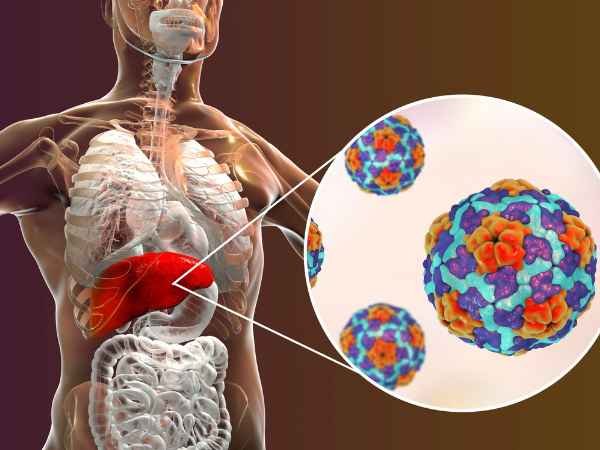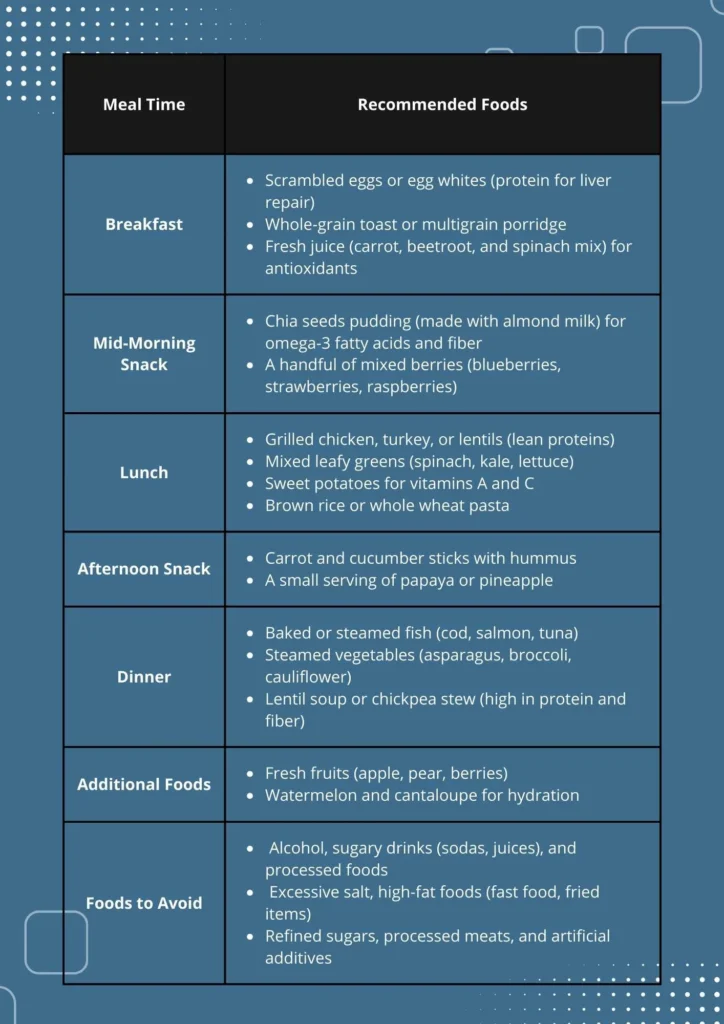Hepatitis Diet plan and Types of Hepatitis A, B food to avoid
An infection of the liver is hepatitis, which is a very important organ in the body. It removes toxins in the human body, contains nutrient stores and digests. According to WHO[1], a well-balanced diet plays a very significant role in recovery and overall health because it tends to support immunity and regeneration of the liver. As you know that all the organs of our body are important in our body, which includes many organs like heart, liver, lungs, kidneys, in which today we will talk about Hepatitis Diet plan, its job is to remove toxins, by-products and other harmful substances from our body, but hepatitis causes inflammation in the liver and creates problems in the proper functioning of the liver.

Today we will discuss about hepatitis, so let’s start. In this guide we will talk about Hepatitis diet plan, its types of hepatitis, the importance of the diet plan, foods to take and to avoid, besides practical tips and unique insights for effective management.
Understanding Hepatitis: What You Should Know
Hepatitis affects the liver, which is the most important organ of the human body. It helps with many important tasks like detoxifying the body and producing energy. This is usually caused by viruses that affect the liver, but also happens due to alcohol toxins or autoimmune diseases. The two most common types are hepatitis A and B. Types spread in different ways have wearing levels of severity and lead to different long-term effects on health.

Hepatitis Types A:
Hepatitis A is an infection that happens because of hepatitis. HAV virus affects the liver. It is majorly spread by consuming contaminated food or drinking unclean water or by coming in direct contact with a person that has hepatitis. Hepatitis A is normal in India where poor sanitation and hygiene can lead to outbreaks according to the Indian ministry of health. In some areas as many as 40%[2] of people may have had it at some point in their lives. The good news is that hepatitis A doesn’t cause long-term liver damage. Usual symptoms include feeling very tired, yellowing of the skin and eyes called joints, loss of appetite and nausea. Most people recover fully in a few weeks to months with proper care.
Hepatitis Types B:
Hepatitis B Hepatitis B is caused by the Hepatitis B virus, or HBV through blood, semen, or other
bodily fluid. The form of the disease could be either acute or chronic and can result in serious complications if chronic, like cirrhosis or even liver cancer. According to the ICMR, about 40 million people in India are suffering from chronic Hepatitis B. It is one of the most usual chronic liver diseases present in India. The WHO estimates that almost 10%[3] of patients who are suffering from chronic Hepatitis B may result in liver cirrhosis or liver cancer, if not treated in time. Early symptoms of the disease include joint pains, dark urine, and abdominal discomfort.
The liver carries a number of roles in digestion, detoxification, and storing nutrients, therefore, Hepatitis is a severe disease. Early detection[4] and lifestyle changes targeted to alterations in dietary intake and medical treatment must be performed to help the patient avoid complications and improve their standard of living. Through the knowledge of causes, symptoms, and preventive measures, patients can proactively take preventive measures to either control or prevent Hepatitis effectively. Now before understanding the Hepatitis diet plan, let’s understand the role of food in Hepatitis.
Hepatitis Diet Plan Management Full-Day
Diet plays a very important role in the management of hepatitis A and hepatitis B in supporting the healing process of the liver and general overall health. Both cause inflammation to the liver which would impair its function altogether. A well-balanced diet can help soothe inflammation, improve immunity and promote liver regeneration. Where is the summary of the rule of Titan managing hepatitis:

Supporting Liver Health
The liver is considered the human body’s primary detoxification organ which metabolizes nutrient digestive products and is toxic. The result during hepatitis infection is all the nutrients that reduce oxidative stress levels and enhance immune function. The antioxidants found in fruits and vegetables would neutralize free radicals by fiber aid in detoxification and digestion processes.
Enhancing Liver Regeneration
The liver has an incredible ability to regenerate but this process requires the right nutrients. Protein rich foods like chicken, fish, Lentils and tofu are essential for tissue repair. For hepatitis patients getting adequate protein health rebuild liver cells and improve overall liver function. Foods rich in B vitamins like whole-grain egg greens also support liver health and metabolism.
Reducing Inflammation
Chronic inflammation is one of the major causes of liver damage and complications from hepatitis. Adding anti-inflammatory so your diet may help to reduce the information that vers the disease. Salmon flaxseeds and walnuts containing omega-3 fatty bitch have shown anti-inflammatory benefits to the function of the liver. Turmeric and ginger have also been proven to have anti-inflammatory properties that can help manage hepatitis symptoms and help heal the liver.
Maintaining a Healthy Weight
Obesity greatly increases the risk of progressing to liver disease especially with hepatitis B. Training a healthy weight through proper nutrition is very important to decrease the risk of fatty liver disease which will worsen the condition of hepatitis. Date with low-fat Whole Foods open weight management such as fruits vegetable and need proteins World hepatitis aligns.
Hydration
Proper hydration is essential for the function of the liver. Significantly be affected even during an illness by dehydration secondary to hepatitis. India water as well as coconut water herbal tea of fresh fruit juices help maintain fluid balance and eat in the detoxification of liver.
Foods to Avoid
Food can put extra stress on the liver and disrupt the process of its recovery. Sodium temperature processes food sugars and transfers me ex bate inflammation versus the liver function. Indicate that the consumption of fried food, heavy meat as well as excessive salt should be avoided by people suffering with hepatitis. Espressos increase the workload of the liver. These stressors increase the workload of the liver

Detailed Diet Plan for Hepatitis A
Sum up,
In the case of hepatitis A and B there has to be a commitment to diet and lifestyle besides treatment. Results can be achieved through a nutritionally well balanced mix antioxidant properties low-fat protein alcoholic intake should be avoided along with processed foods and diets high in fats. Personalize your diet according to what is locally in season and seek recommendations from healthcare providers. Consistent changes over the long-term can result in health and vitality.
References
We value truthful content. 4 sources were referenced during research to write this content.
- Healthy diet. (n.d.). Healthy diet. Retrieved from https://www.who.int/initiatives/behealthy/healthy-diet
- Information/NLM/NIH, N. (2017). gprobe. GitHub repository. Retrieved from https://github.com/ncbi/gprobe
- Hepatitis B. (n.d.). Hepatitis B. Retrieved from https://www.who.int/news-room/fact-sheets/detail/hepatitis-b
- Filippini, T., Malavolti, M., Whelton, P. K., Naska, A., Orsini, N., & Vinceti, M. (2021, April 20). Blood Pressure Effects of Sodium Reduction. Circulation. Ovid Technologies (Wolters Kluwer Health). http://doi.org/10.1161/circulationaha.120.050371


